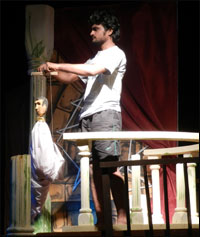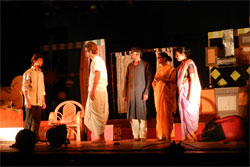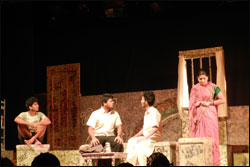|
|
 |
|
|
SLICE OF LIFE |
| ''A film should be reviewed within the constraints of its genre''. Vikas Desai, an FTII veteran, told aspiring journalists at a workshop organized at the National Film Archives of India (NFAI). Pune's drama-goers and drama-lovers needed to be forewarned with this statement as a disclaimer before the three prize-winning one-act plays of the 'Pravin Joshi Competition' were staged before them on October 27 2012 at the Yashwantrao Chavan Natyagruha. The inter-college competition is organized in Mumbai every year by the Indian National Theatre and the genre these plays comply to should be read in a filmy-commercial sense.
To start with, we had three Shakespearean actors (as characters) in front of us. The play was the third-prize winner. SLICE OF LIFE by CHM college narrated the plight of three failed theatre actors, devotees of Shakespeare, who are supposedly disowned by their own audience because they couldn't keep up with the times. The actors have now locked themselves up in a house and are spiteful of the world that does not understand them. The play had numerous monologues of Shakespeare's characters, effectively translated and interpreted in Marathi. As the protagonists slip into these characters and deliver them incessantly, their understanding and preparation got highlighted. The creatively designed set had a throne in the centre reserved for their beloved Shakespeare. The bearing of the actors had an acute vulnerability to slip into their favorite characters from the Master's dramas and this created a promising ambience.
The premise of A SLICE OF LIFE, thus, is very experimental. Commercial elements however seep in as the play progresses with the entry of a fourth character and with the statements that he starts to make. Though the characters of the three actors stand out neatly amongst the organized chaos of Shakespeare's characters, their scheme is typical - a leader or decision-maker, an aching introvert and the joker of the pack. In an effort to relate them to their favourite characters, their past-life stories are revealed and unfortunately, their melodramatic nature finds no connect with the audience.
The fourth character who poses as the writer and his broad ranging statements have a similar effect. To the playwright Shripad Deshpande's credit, all the statements are very good observations and some of them received applause from the audience. But as Cleanth Brooks would say, they seldom ''emerge out of the context'', and seem arbitrary. The writer's character, however, was the biggest failure. It seemed to be planted to highlight the struggle of the three actors and the fact that it appears as a deliberate intervention, is somehow distasteful.
The stage and the set are beautifully used by the three actors prior to the writer's entry but later becomes a ground of physical activity for the writer as he first mocks, then tries to run out of fear and when he finally tries to save the lives of the three actors after they poison themselves. The argument suddenly shifts between the will to live and death as a final solution. The thread that holds all this together is the intriguing background music that keeps the mood dark throughout.
The curtains fall on a positive note as the actors decide to fight back and stand to recite monologues simultaneously. The scene is well done and appears as a moving frame. The impact is felt as it underlines the will to live over the temptation to die. It however leaves a more important argument unanswered or rather unexplored - are Shakespeare's dramas and his characters still relevant?
|
 |
|
|
BANDH NYLON CHE |
| The second play BANDH NYLON CHE (Strings of Nylon), which won the first prize, capitalized on the lights, gimmicks and commercialism. ''The speed of these plays is different'', Harshal Ukhande, co-organizer of the shows in Pune, explained aptly. The advantage for the play was that the makers seemed to be completely aware of this fact, along with the jury that included Rajan Tamhane and Prakash Buddhisagar amongst others. So there are outright filmy elements like a door knocking when a couple is in a mood to get intimate or human-like robots dancing to 'Satyam Shivam Sundaram' with a western twist. What is more outright is the theme itself - humans are turning into robots.
A club owner 'supplies' relatives in the form of robots. A family hires two of these as grandparents to their daughter. Through unapologetic use of gimmicks and brilliant performances from the actors, the play rolled out hilarious and entertaining scenes. The actor as the club owner excelled so much that his caricature-ish character appeared deliberately designed. The playwright Ambar Hadap does not get into the technicalities of the robots, but doesn't leave them untouched either. In a hilarious scene, the robots repeatedly introduce themselves because they are asked the same question with different intentions and the scene shows that robots cannot replace humans. All is well with the story and with the play till the real 'human' grandparents enter.
The play stumbles into a sequence where the real grandfather sheds a tear at the situation and his robot-counterpart collects and wonders about it. This was a high point and the scene should have ended here leaving the audience in a state of melancholy wondering what the robots must be 'feeling'. Sticking to the norms of commercialism (blunderingly on this occasion), the makers choose to make the robots emotional as they question themselves - why can't we cry?
''That is desperation and not emotion,'' one of the members from the directorial team of ML Dahanukar college said in an attempt to clarify. He added, ''the robots say in the scene - we are brought as humans to this house and we should be able to do whatever the humans do. It is a logical thought.'' Akhil Khandeparkar, a student of film and video design at the MIT Institute of Design, was in the audience and was not convinced. ''I really liked the concept. But it was too loud and commercially staged to relate to. It should have been mellow. Everything was said. Some things should have been left for the audience to interpret. Silence should have been used. And how could the robots get emotional? It was difficult for me to differ between the robots and the humans in the play after that.''
Akhil's argument is proved as the robots 'plan' to teach their children a lesson. The question, however, is still valid - is it wrong to be commercial or loud? We tend to perceive theatre as an experimental platform. Even the immensely popular play SAHI RE SAHI does many experiments within in its strictly commercial borders. Or the 'Firodiya Karandak' inter-collegiate competition in Pune that promises to bring cinema on stage. Even if we remove this perception temporarily, Akhil's reaction poses an answer - relating to the audience. Even if the details, the theme, the story are far-fetched or even loud, the characters must be convincing. It is a mandate for any story. Part of this convincing depends on the actors and the ones in BANDH NYLON CHE do so efficiently. The other part, however, depends on the writing and here, the character-graphs of the robots are very uneven. Nonetheless, the play keeps scoring on the entertainment quotient throughout and its dark humor is underlined as the humans become robots in the end.
|
 |
|
|
EKUT SAMUHA |
| Arguably the best of the lot was the second-prize winning play - EKUT SAMUHA (a homogenous group) by Kirti college. Based on a story by Rajan Khan, the play depicts a family having interesting inter-personal relationships. The mother is much younger to the father; they hardly talk but love and respect each other. Their son is the mother's best friend and their rapport is superbly established in scenes where they secretly smoke or talk about the son's love-life. Gimmicks are effectively used to narrate flashbacks where characters from the past directly enter the ongoing scene. The set is also wittily designed with the years written over the furniture suggesting the time the characters have spent in the house. The lights were also used creatively, especially the one streaming sunlight in from the window.
Surprisingly, unlike the first two plays, the actors playing the mother and the father didn't do full justice to the script. The mother showed energy in her 'curious about life' character and in her steadfastness to her husband but she was mechanical in her portrayal. Everything was neat but too neat to be real. A certain artificiality creeps in her performance every now and then. The father's portrayal of his character was inconsistent. The actor playing the father had very few scenes. An introvert character, he also had very few dialogues. But a flashback scene where his wife is about to deliver a baby, becomes unintentionally funny as he says - I should never have done this to you. In an attempt to insert some situational humor, the play shifts its base for a while from its originally subtle and light-hearted humor.
The actor playing the son was refreshing. He not only understood the nuances of his character but he also held the narrative together. In a story that didn't have any major incidents apart from the flashbacks, his monologues added to the dramatic effect. Again, too much was said explicitly but the actor carried it off well. In the commercial context which the plays were staged in, EKUT SAMUHA overall fared better than the other two plays.
''The artists were a little scared as they didn't receive applause where they expected'', Harshal Ukhande said with a smile. ''Pune's audience is certainly choosy. But I wanted to show Puneites a different approach to drama. The response is not as expected; there were only 300 in the audience against the 700 expected. Bur we hope to catch on,'' he added.
INT's plays were certainly a new experience for Pune's audience. This year might just serve to define the approach to watch them. A member in the audience said after EKUT SAMUHA - 'yeh toh Barfi tha' (it was like the film Barfi). It suddenly struck me what the background music in the play was reminding me of.
Praveen Lulekar is a student of Ranade Institute in Pune and is studying Mass Media.
|